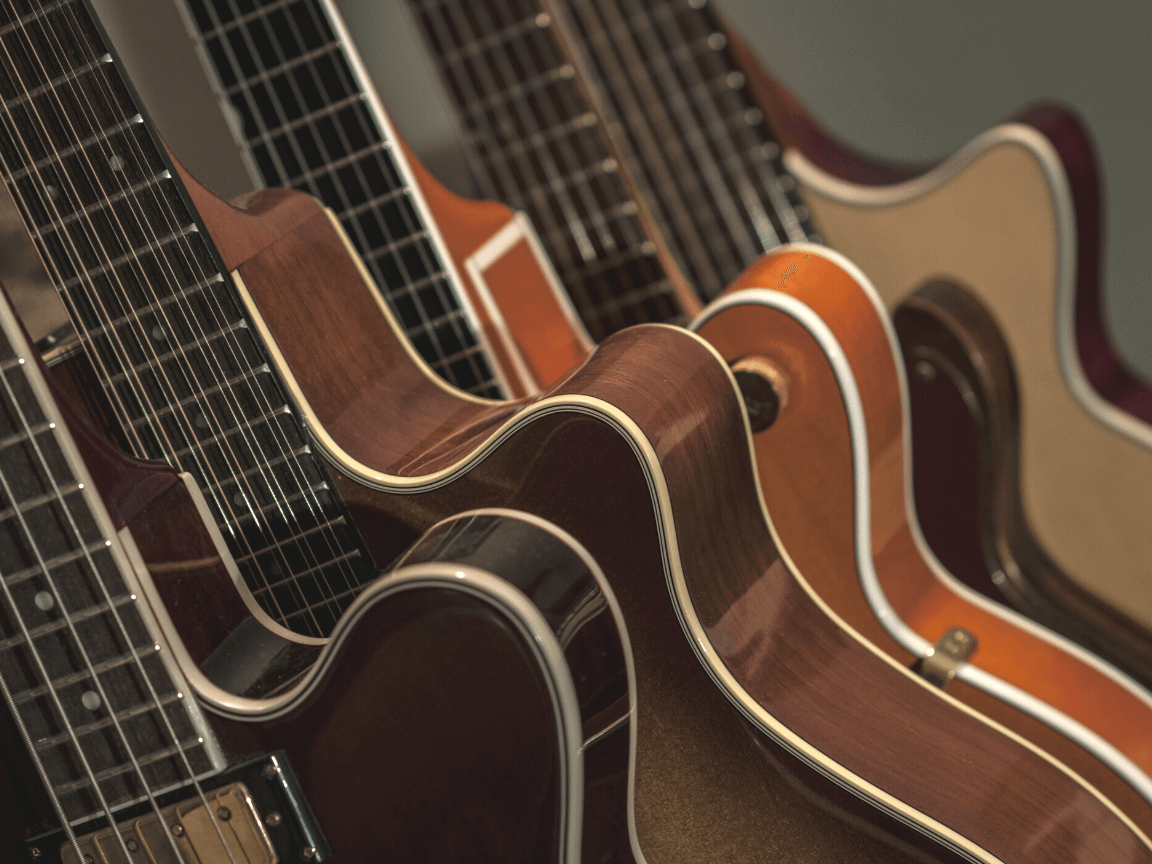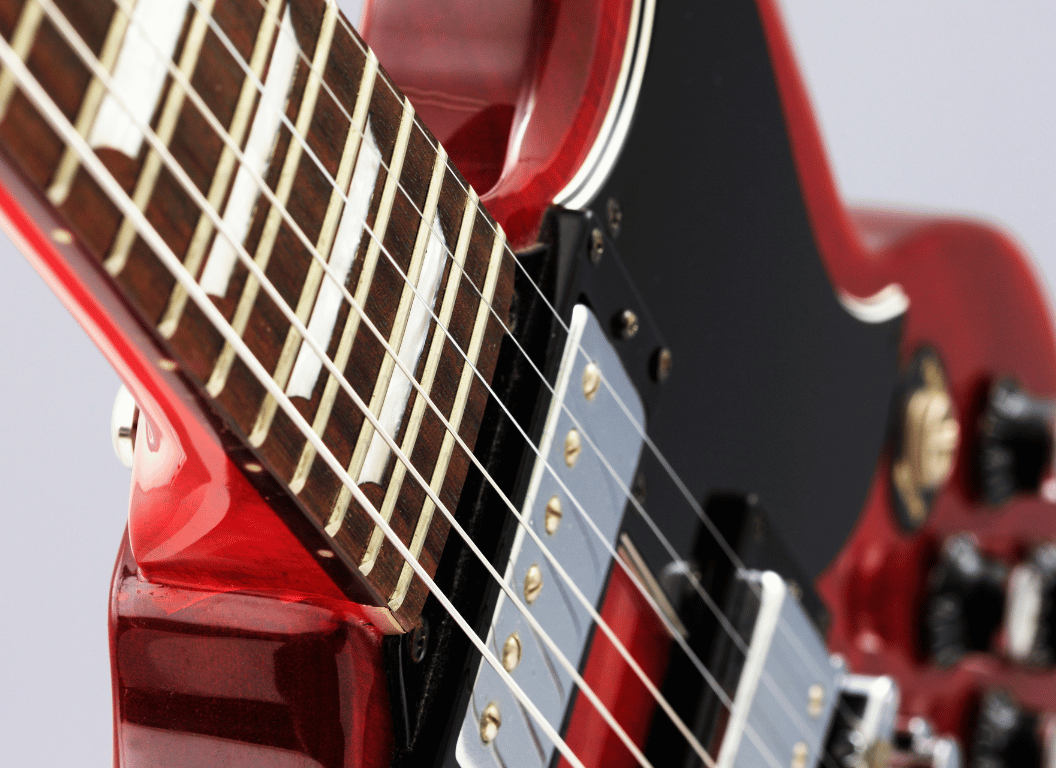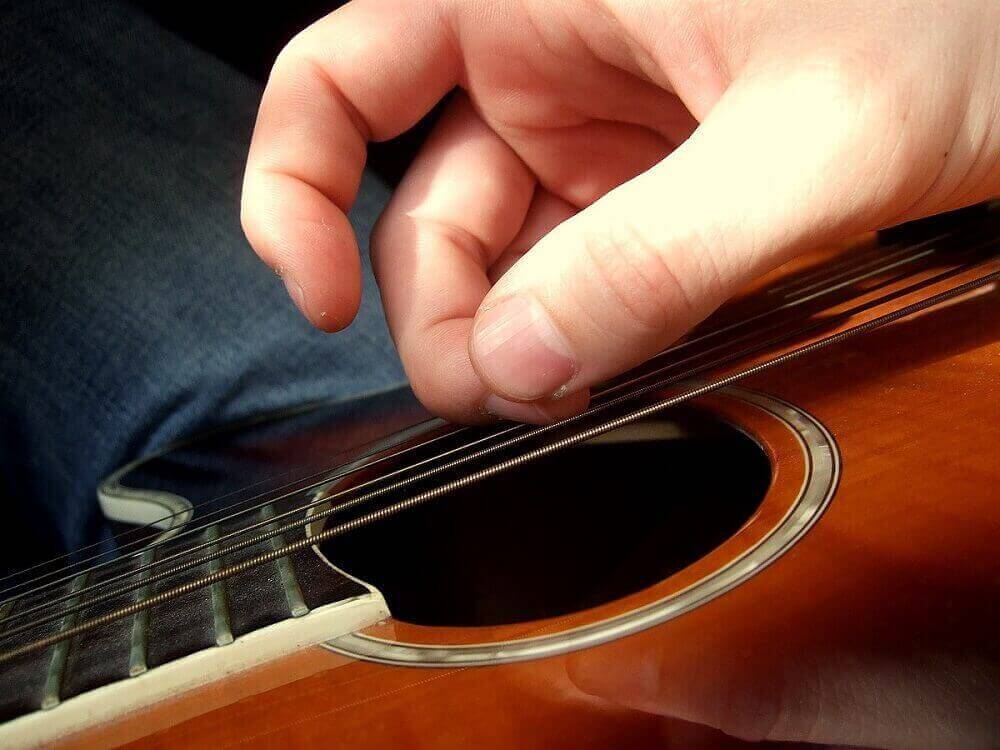If you’re new to the world of guitar playing, you may be wondering which type of guitar is the easiest to learn so that you can choose that one.
With so many different types of guitars available, it can be hard to decide which one is best for you.
Most of them have different shapes, sizes, scale lengths, and materials they are made of.
This article will provide an in-depth look at the different types of guitars and their benefits and drawbacks.
After this, you should have enough information to make an informed decision about which one is the easiest to learn, or simply which one you’d like to play the most.
Table of Contents
- Which guitar type is easier to learn?
- Acoustic Guitar
- Electric Guitar
- Comparison of Acoustic and Electric Guitar
- Factors to Consider When Choosing a Guitar Type
- Challenges of Learning the Guitar
- What is the most versatile guitar model?
- Which 3 guitars should you own?
- Is there a guitar that is best for all types of music?
- What is the easiest style of guitar to play?
- Final thoughts
Which guitar type is easier to learn?
It depends on the individual’s preference and skill level. Beginners may find an acoustic guitar easier to learn since it requires less maintenance and is less expensive than an electric guitar. An acoustic guitar also has a simpler setup than an electric guitar, which can make it easier to learn chords and basic techniques. Electric guitars require additional equipment such as an amplifier and cables, which can be more complicated for a beginner.
Now, if you’re looking for a type of guitar that can produce a wide range of sounds, then an electric guitar may be the best option.
The sound produced by an electric guitar is usually louder and more powerful than that of an acoustic guitar, which can make playing easier.
It will also allow you to experiment with different sounds and effects.
Overall, any guitar type can be learned with enough practice, so you should consider your needs and preferences when deciding which one is the easiest to learn.
It’s important to remember that it takes dedication and determination to master a guitar regardless of the type, so make sure you find something you genuinely enjoy playing.
Acoustic Guitar
– Overview of the acoustic guitar
The acoustic guitar is a stringed instrument that has been around for centuries and is one of the most popular instruments in the world.
It is a versatile instrument that can be used to play a variety of musical styles, from classical to rock, and encompasses both accompaniment and solo playing.
The acoustic guitar is typically made of wood, with a hollow body that amplifies the sound of its strings and helps project the sound.
It has a long neck and six strings, usually steel or nylon, tuned to standard intervals (E-A-D-G-B-E) that are strummed or plucked using either the fingers or a pick.
The sound of an acoustic guitar can be altered by the shape and size of its body, as well as different string gauges and types, wood types and treatments, fingerboard radius, and pickup type (if equipped).
– Advantages of learning the acoustic guitar
Learning the acoustic guitar has many advantages, some of which include developing finger strength and dexterity, improving your knowledge of music theory, and discovering different styles of music.
It can also be an enjoyable way to spend time with friends or family, and it is often used in social settings such as parties or concerts.
Playing the acoustic guitar can even provide a form of stress relief or personal expression, depending on how you choose to use it.
On the other hand, mastering a new instrument can also be an invaluable life skill, and the acoustic guitar is no exception.
It can unlock many creative possibilities, and give you a sense of accomplishment and satisfaction that comes with mastering something that once seemed impossible.
– Disadvantages of learning the acoustic guitar
Even though most people agree that there’s little to no downside to learning the acoustic guitar, some people may find it difficult or frustrating at first.
It takes time, commitment, and dedication to develop a skill such as playing an instrument; however, once you begin to make progress and see results, it can be incredibly rewarding.
Other potential disadvantages include having to invest in equipment such as strings and picks and perhaps even having to purchase or rent an instrument.
Additionally, depending on how loud the playing environment is, it may be difficult to hear yourself clearly – something that can make practicing quite a challenge.
Electric Guitar
– Overview of the electric guitar
The electric guitar is one of the most popular instruments in the world and has been around for over a century.
It is made up of a neck, body, strings, pickups, and an amplifier which are all connected to create the sound that you hear when playing the instrument.
The electric guitar has enabled musicians to create unique sounds with the help of effects pedals and other equipment and has become one of the most versatile and popular instruments in modern music.
Also, electric guitars are used in a wide array of genres including rock, blues, jazz, country, and metal.
– Advantages of learning the electric guitar
Learning the electric guitar has many advantages, and some of them are very similar to those of learning to play the acoustic guitar.
For example, learning the electric guitar can help you to gain better coordination and finger strength as well as teach you how to read music.
It also helps to develop discipline, patience, focus, and creativity in many aspects of life.
Moreover, the electric guitar is a great way to start learning and performing with other musicians, which can be a very rewarding experience.
On the other hand, it’s incredibly versatile and can be used to create an infinite variety of sounds with different effects pedals, and amps.
– Disadvantages of learning the electric guitar
Again, even though the pros outweigh the cons when learning to play electric guitar, there are still some things to consider.
One of the major disadvantages is that it can be quite expensive compared to other instruments.
You will need an amplifier, effects pedals, and possibly even a guitar stand in order to get the most out of your instrument.
Moreover, since the electric guitar requires electricity for the sound to be amplified, there can be a lot of noise and feedback if your guitar is not set up properly.
It also honestly takes time, patience, and dedication and it might take a while before you are able to master the instrument.
For some, this can be a bit discouraging, but for others, it’s actually very motivating.
In the end, learning to play the electric guitar can be a very rewarding experience that will teach you a lot about yourself and the world around you.
Comparison of Acoustic and Electric Guitar
– Similarities of both types
Both acoustic and electric guitars are stringed instruments that are played by plucking the strings with a pick or the fingers.
They have a neck and a body and are used in many different musical genres today.
When it comes to similarities, both types of guitars have a similar structure and design.
They both have a neck, a body, a fretboard, strings, tuning pegs, and pickups.
Also, the number of strings and the tuning of the strings may vary depending on the style of the guitar, but they both use the same basic principles of playing.
– Differences of both types
When it comes to differences, the most obvious difference between acoustic and electric guitars is the way they produce sound.
- An acoustic guitar produces sound by vibrating the strings, which then vibrate the air around them to produce sound.
- An electric guitar produces sound by sending the vibrations of the strings through an amplifier and speaker.
This allows the sound to be louder and more powerful than an acoustic guitar.
Another difference is that an electric guitar needs to be plugged into an amplifier in order to produce sound.
An acoustic guitar does not need any extra equipment and can be played without an amp if desired.
Acoustic guitars are also typically thought of as being better for strumming chords and playing folk music, while electric guitars are usually used for more complex solos and riffs.
They both serve their own unique purposes in the world of music, and it all depends on what type of sound a musician is looking to achieve.
No matter which guitar a person chooses, they are sure to find countless hours of enjoyment within its strings.
Factors to Consider When Choosing a Guitar Type
When it comes to choosing a guitar type, there are a few key factors to consider.
– Your skill level and proficiency
Firstly, your skill level should be taken into account.
If you’re a beginner, then an acoustic guitar is a great choice as it’s relatively easy to learn, and you’ll still be able to progress with it as you improve.
As opposed to an electric guitar, which will require more skill, gear, and knowledge to be able to get the best out of it.
On the other hand, if you’re an experienced player, the range of electric guitars available will give you more options to play with different styles and sounds.
– The genres that you want to play
The type of music you want to play should also be a factor in selecting your guitar type.
For example, if you’ve decided that blues is your genre of choice, then an acoustic guitar is probably best suited for that.
However, if you’re looking to produce a heavier, more distorted sound, then an electric guitar is the way to go.
Another example is if you want to play classical or Spanish music, then a nylon-stringed guitar would be the best option for that, instead of the steel-stringed acoustic or electric guitars.
– Your budget and max value
Your budget is also an important factor to consider when selecting the type of guitar you want.
Acoustic guitars are generally cheaper than electric guitars, so if you’re on a budget then this is probably your best option.
If you have a larger budget, then there are plenty of options when it comes to electric guitars, from low-cost beginner models to higher-end professional instruments
Of course, this doesn’t mean that if you have a large budget, you can’t get an acoustic guitar… you can, there are just more options when it comes to electric guitars.
– Personal preference and style
Another thing to consider when choosing a guitar type is personal preference and style.
If you know that you prefer the look and feel of an electric guitar over an acoustic one, then go for it.
The same goes for the sound, if you want to be able to play heavier rock music or produce more complex tones, then an electric guitar might be a good choice for you.
What you should remember is that the type of guitar you choose should be determined by your skill level, budget, and what type of music you want to play.
Challenges of Learning the Guitar
– Difficulty in learning
Learning to play the guitar can be a difficult task since it requires dedication and practice in order to become proficient at playing.
Some of the challenges include mastering techniques such as strumming, fingerpicking, and fretting.
But it also takes time to develop the muscle memory needed to play difficult chords or melodies and to learn music theory.
It is also important to develop a good sense of rhythm, as well as the ability to play in time with other musicians.
But again, these are all things that take time and dedication to master and are not something that can be accomplished overnight.
– Lack of motivation
Another potential challenge when learning the guitar is a lack of motivation for practice.
It is easy to get discouraged when progress is slow or when the technique is not improving, but it is important to stay motivated and keep pushing through the hard times in order to make real progress.
Finding motivation can come from a variety of sources such as lessons with an experienced teacher, attending performances by great guitarists, or listening to music that inspires you.
On the other hand, having a consistent practice routine and setting achievable goals will also help to keep motivation levels up.
What is the most versatile guitar model?
When it comes to guitars, one of the most versatile models is in my opinion the Fender Stratocaster.

This classic electric guitar has been around since 1954 and is still one of the most popular models today.
It is known for its bright, crisp tone, which makes it ideal for a wide range of musical styles, from blues and rock to jazz and country.
The Stratocaster also features three single-coil pickups, which provide a wide range of tones and allow for a variety of sound combinations.
The guitar also has a five-way switch that allows you to select different pickup combinations, giving you even more sound options.
It’s also incredibly easy to play, and has a comfortable neck and a smooth fretboard, plus its classic design makes it a great choice for both beginners and experienced players alike.
Which 3 guitars should you own?
If you’re a guitarist, you know that owning the right guitar is essential for getting the sound you want and playing the way you want.
There are so many guitars out there, so it can be really hard to decide which three to own.
A great place to start is with a classic electric guitar like a Fender Stratocaster or a Gibson Les Paul.
These guitars have been around for decades and have been used by some of the greatest guitarists of all time.
Next, you should consider an acoustic guitar if you already don’t have one.
This could be a steel string guitar like a Martin or Taylor, or a classical guitar like a Ramirez or Cordoba.
Acoustic guitars are great for playing fingerstyle, strumming, and other styles, so they can give you a chance to diversify your abilities and have more fun playing.
You should also consider an electric guitar with humbucker pickups, like a PRS or an Ibanez RG.
These guitars are great for getting heavier sounds, like metal and hard rock.
Humbucker pickups also produce more sustain than single-coil pickups, which can give your sound more depth and character.
All of these guitars have something unique to offer, so if you own any combination of them, you’ll have a great range of sounds and styles to work with.
Is there a guitar that is best for all types of music?
When it comes to finding the best guitar for all types of music, it can be a difficult task.
There is no one guitar that is best for all types of music, as each genre has its own unique sound and playing style.
Generally speaking, a good all-around guitar should have a comfortable neck, good action, and a quality tone.
Electric guitars are usually the best choice for rock, blues, and metal music, while acoustic guitars are better suited for folk, country, and classical music.

When shopping for a guitar, it’s important to consider the type of music you plan to play, as well as your budget and playing style.
If you’re looking for a versatile guitar that can handle a variety of styles, you may want to consider a semi-hollow or hollow body electric guitar, as these guitars are capable of producing a wide range of tones.
What is the easiest style of guitar to play?
The easiest style of guitar to play is definitely the acoustic guitar.
Its strings are easier to press down than those of an electric guitar, and the body is usually much lighter, making it easier to hold and play.

Acoustic guitars also tend to have a wider neck than electric guitars, which can make it easier for those with larger hands to reach the strings.
They are typically less expensive than electric guitars, so they’re a great choice for those who are just starting out and don’t want to spend much money.
Final thoughts
Overall, it is clear that there is no single type of guitar that is easier to learn than the others.
The type of guitar that is best for a beginner will depend on their own personal preferences and goals.
Acoustic guitars are great for beginners who are looking for a more traditional sound.
Electric guitars are great for those who want to explore different genres and styles.
Classical guitars are great for those who want to learn classical music.
Whichever type of guitar you choose, it is important to remember that practice and dedication are key to becoming a successful guitarist.
With the right approach, any type of guitar can be mastered.

Born and raised in Florida! I’ve been playing guitars for the past 5 years. Love to learn, and I’m always striving to achieve greater heights in music. Currently have a Fender Stratocaster as my main guitar.




